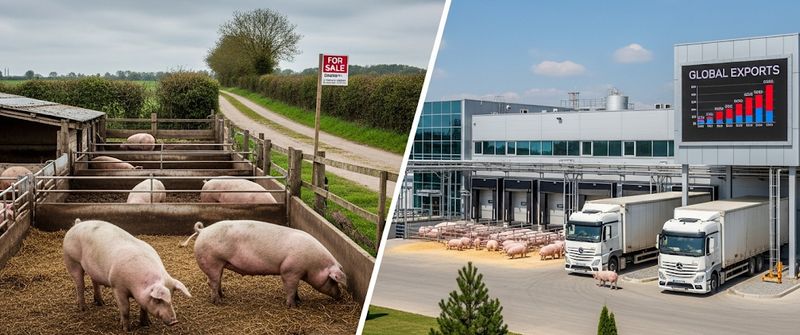
Animal Welfare Delay - UK Pig-Contract Shake-Up, and Eastern Europe’s Pork Boom
Five developments shaping procurement, compliance and demand this week—Eastern Europe’s pork upswing, a UK pig-contract overhaul, and tighter fraud surveillance top the list.
EU/UK Meat Processing Briefing — 8 August 2025
Germany delays animal-welfare label rollout to 2026 (DE/EU)
What happened: Germany’s federal government confirmed that its mandatory animal-welfare labelling scheme for fresh pork will be delayed from 2025 to early 2026, citing technical and retailer-integration issues. The scheme will require labels specifying housing conditions (indoor, outdoor, free-range).
Why it matters: This gives German processors, exporters, and importers more time to adapt packaging, traceability systems, and sourcing to meet welfare-tier requirements. EU suppliers into Germany also have extra runway to align specs.
Implications & suggested actions:
Use the delay to audit product lines destined for Germany and match welfare tiers to label categories.
Engage with German retail buyers now to understand future procurement preferences.
Consider marketing welfare-tier compliance early for premium positioning ahead of rivals.
UK pig-contract rules start 13 August: written terms, pricing clarity, dispute processes (UK)
What happened: The Fair Dealing Obligations (Pigs) Regulations 2025 come into force on 13 August 2025. New pig purchase contracts must be in writing, include clear pricing, duration, termination and dispute resolution terms, with a 12-month transition for full compliance.
Why it matters: This shifts bargaining dynamics and compliance risk for UK pig processors and large buyers. Expect contract audits and potential renegotiations.
Implications & suggested actions:
Conduct an immediate contract gap-analysis; standardise templates across procurement.
Build a pricing formula library (e.g., SPP-indexed, cost-plus) and automate notices/variation logs.
Set up an independent dispute channel and train category managers on the new rules.
Food-fraud alerts rose in June: 164 potential cases reported across Europe (EU)
What happened: The number of potential food-fraud reports logged by European authorities rose to 164 in June, from 129 in May. Categories span mislabelling, composition, and origin issues.
Why it matters: Rising alerts increase recall, brand and regulatory risk—particularly for complex multi-country meat supply chains.
Implications & suggested actions:
Tighten vulnerability assessments in VACCP; raise incoming COA sampling on at-risk inputs (spices, marinades, speciality trims).
Add origin verification (e.g., mass-balance or isotopic testing) for premium cuts and PGI/PDO items.
Contractually require rapid traceability data within 4 hours for tier-1 suppliers.
Eastern Europe drives EU pork growth (BG/RO/PL/HU)
What happened: EU pork production has risen for a second year, with Eastern Europe leading the growth—Bulgaria (+14.2%), Romania (+12.3%), and gains in Poland and Hungary.
Why it matters: Additional regional supply can ease raw-material tightness for processors in Central/Eastern Europe and support price competition on commodity pork.
Implications & suggested actions:
Revisit sourcing splits: trial secondary suppliers in BG/RO/PL/HU to diversify risk and improve delivered cost (Try Meat Borsa to find new suppliers)
Secure specification alignment (fat/lean ratios, cut plans) before Q4 promotions.
Monitor ASF biosecurity and contingency routing to avoid disruption.
European meat-snacks market set to more than double by 2033 (EU)
What happened: New market research projects the European meat-snacks sector will grow from around USD 3 billion in 2023 to nearly USD 6.9 billion by 2033, driven by high-protein snacking trends, convenience demand, and retail innovation. Growth is strongest in Germany, the UK, and Central/Eastern Europe.
Why it matters: This is a high-margin growth category for processors and brand owners, offering diversification away from commodity cuts.
Implications & suggested actions:
Evaluate NPD pipelines for shelf-stable or chilled meat snacks (jerky, salami sticks, protein bars).
Align with retail and e-commerce buyers in growth markets; leverage health and convenience marketing angles.
Explore co-branding with sports, travel, or outdoor-lifestyle partners to reach younger demographics.
Sources
Germany delays animal-welfare label rollout to 2026 (DE/EU) Euromeatnews
UK pig regulations: Meat Management (7–8 Aug 2025); Farmers Guide (7 Aug 2025).
Fraud alerts: Food Safety News (8 Aug 2025).
Eastern Europe pork growth: Pigua.info (28 Jul 2025).
Meat-snacks market: Yahoo Finance (5 Aug 2025); New Food Magazine (4 Aug 2025).
